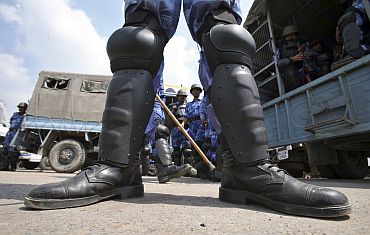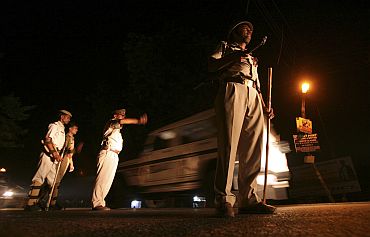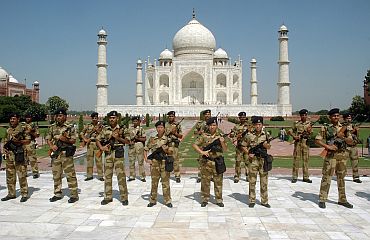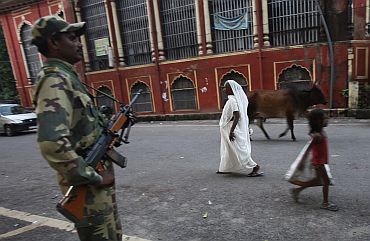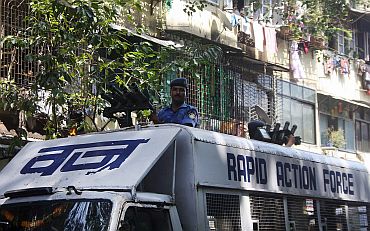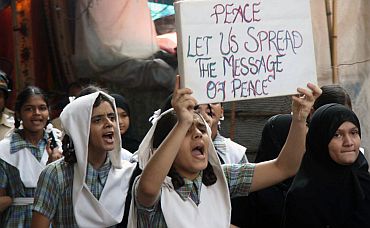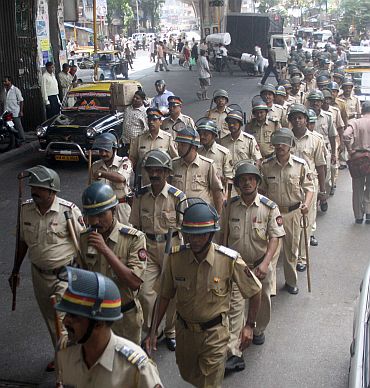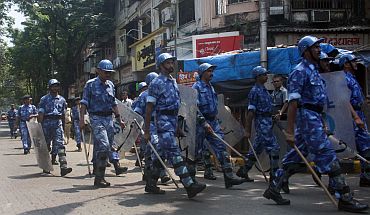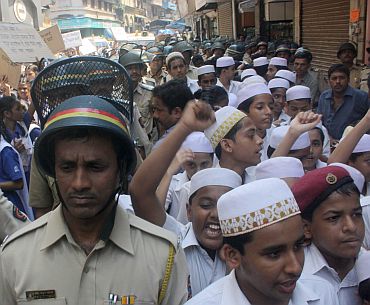 | « Back to article | Print this article |
Why Congress is nervous on judgment day
The Congress-led government has taken a defensive position on the political battleground in the Ayodhya title suit on September 30 to be delivered by the Lucknow bench of the Allahabad high court.
The government has cleverly tried and hoped that legal means will delay the judgment. But it had a reality-check when it got the feedback, which forced it to change tactics.
There were doubts that the government wanted to defer the judgment because the law and order situation could turn volatile or that it was unwilling to disturb the communal tranquility that has existed in the last eight years.
Also, there were events that the government needs to attend to: The Commonwealth Games, the upcoming Bihar assembly elections and United States President Barack Obama's visit in early November.
Please click NEXT to read Sheela Bhatt's analysis...
'We would have considered any delay as anti-Muslim'
A senior member of the All India Muslim Personal Law Board told Rediff.com, "If the Congress had tried successfully to delay the Ayodhya judgment, then we would have considered it an anti-Muslim act. It would have been no less sinful than allowing Hindus to worship at the site by re-opening the locks in February 1986."
Muslim leaders have high hopes of winning the title suit in the case.
After a lot of nervousness and covertly supporting the 'hopeless' idea of an out-of-court settlement, the Congress party changed track and is now coming out with revised nuances of the situation.
Historic times are here and now
Even if any side celebrates the verdict, it could trigger off a chain of unwanted events.
India, which is wiser after the 2002 Gujarat riots, is showing maturity. Even Gujarat Chief Minister Narendra Modi, a leader considered responsible for the anti-Muslim riots in 2002, has issued a peace appeal, which was unthinkable in 2003.
Every state is on high alert and sensitive pockets are under the government's scanner.
Although it seems a little artificial, it is good to see political leaders appealing to the people to remain calm and talk of respecting the court verdict (everyone had that same option when the Babri Masjid was demolished).
In the last couple of days, thousands of 'miscreants' have been rounded up all over the country.
The police has seized hundreds of weapons.
The police have banned pillion riding on two-wheelers.
The central government has banned bulk SMS.
The security measures are such as if there is an undeclared war coming.
'The government's announcements are almost spreading panic'
This must be the first occasion in recent times where the prime minister has published his explanation in various languages, telling the Indian people how to read and decipher a sensitive judgment that has not yet arrived.
The government is doing its utmost to remind Hindus and Muslims that Thursday's high court judgment is not the end of the road. There is a remedy, the government is announcing loud and clear.
On Wednesday, Home Minister Palaniappan Chidambaram evoked God and reminded us of Mahatma Gandhi by reciting at a press conference 'Ishwar Allah tero naam, sabko sanmati de bhagawan.'
This amply mirrors the importance of the judgment and the emotions attached to it.
The emotion is the 'problem area.' Prime Minister Manmohan Singh, in his crisp and short message, said, 'There should be no attempt whatsoever made by any section of the people to provoke any other section or to indulge in any expression of emotion that would hurt the feelings of other people.'
Laozi, the Chinese philosopher, once wrote in his classic Tao Te Ching, that hearts will never be practical until they can be made unbreakable.
On the eve of the Ayodhya verdict, India and Indians are trying hard to be practical. The attempt to keep calm and the requests for peace are so pronounced and public.
A politician, who was a member of Rajiv Gandhi's Cabinet, said, "This is reaching a ridiculous level. The government's announcements are almost spreading panic. How can you ask people not to indulge in riots and not kill people? Is this modern India?"
The development versus Ayodhya debate
That is something new and audacious.
In this regard, Chidambaram on Wednesday said something memorable: 'Don't derail the India story with Ayodhya.'
Is this fear speaking (of managing law and order all over the country) or his confidence, it is difficult to say.
The Congress of 2010 seems to think that prosperity and religion are an exclusive doctrine in peoples' lives.
The home minister, who is a successful lawyer, said there would be no trouble after the judgment.
'I think India has moved on,' Chidambaram said, 'young people have moved on. I think, young people have recognised that the India story is much more than a dispute over a place where one religious group claims they are entitled to more than another religious group.'
'I think India has moved, especially people who were born after 1992. They have a very different world view,' the minister argued.
According to top-level sources, the Congress party is "taking up the challenge" to reinforce its secular credentials and its plank of development with inclusive growth through the Ayodhya debate.
'There are many things which are more important than Ayodhya'
The manner in which Rahul dismissed the Ayodhya issue is trend-setting if one cares to see the Congress party in Uttar Pradesh.
Congressmen are hinting that the old Congress structure in Uttar Pradesh that collapsed after its hazy role during the demolition of the Babri Masjid is not even worth preserving.
That rusted edifice has to go. Rahul seems to be asking for the new party structure in Uttar Pradesh by betting on high-voltage politics for development and not debates like Ayodhya.
Indirectly, he is hinting that he is not emotional because as he says, 'There are other issues beyond Ayodhya.'
Rahul Gandhi and Chidambaram are exploiting the mood in the middle-class who want uninterrupted growth of 7 to 8 per cent.
It is noteworthy that their appeal on such a delicate issue is direct and they are sticking to their secular plank.
Ayodhya is a metaphor
The Ram Janambhoomi issue has lost steam and people have better things to do than worry about building a temple in Ayodhya.
Old Congressmen express these views by saying, "Nateejha kuch bhi aye, kuch nahin hone wala hai (Whatever the verdict there won't be any violence.)"
According to the Congress, the challenge is two-fold.
On one hand the party will have to tackle the champions of the Ayodhya issue, on the other hand its leaders will have to fight fierce political battles with UP Chief Minister Mayawati.
If at all there is any strong reaction to the Ayodhya verdict in UP, Mayawati will act in her Bajuhan Samaj Party's interest. Her stance will be to make sure that it is a disadvantage to the Congress, which is her main political enemy in the state.
Ayodhya is a metaphor.
In India, it is a political issue for some, a religious mission for some, a question of injustice for some, an idea of cultural identity for some. Every one of these sections is looking for justice.
Due to this fact, if the Congress is pushed to the wall by unlikely events, then it will be not just difficult, but almost impossible for it to spell out a clear stand whether it is for a Ram temple or a mosque.
Currently, on the basis of its secular politics, the party says it believes in a harmonious settlement between the Hindus and Muslims and if that is not possible then it would like to wait for the court verdict.
Will the BJP stick to its current passive stance after the verdict?
The party currently says it will abide by the verdict, but in the same breath its leaders say Hindus want a Ram temple built at the site.
Also, after the final judgment, the party may not stick to the current passive stance and could speak about the country's political will as it was shown when the Shah Bano judgment was overturned by an Act of Parliament in 1986.
The Congress does not want to reach any such 'point-of-no-return' with UP Chief Minister Mayawati before the 2012 assembly election in that state.
No political party today, except the Left parties and parties seeking exclusive Muslim votes, can say it would be quite happy to see that a temple is not built at the controversial site.
Even on the issue of the makeshift temple currently at the site, there could be a tussle between the state and central governments if the judgment states something in this regard.
A senior Congress leader says his party will have to be very alert that it does not walk into any trap set by Mayawati.
Congress leaders believe that after the verdict, the BJP, the Rashtriya Swayamsevak Sangh and other Hindu organisations will keep their powder dry.
Most players would wait for the Supreme Court judgment
Most players and exploiters of the Ayodhya issue will wait for the Supreme Court judgment for their final pitch.
Senior Hindu and Muslim leaders are unlikely to indulge openly in any act that would brand them irresponsible and disrespectful of the courts.
Many observers believe that violence, if it occurs after the judgment, will be fragmented and largely due to local political factors.
There is a view that if, after the verdict, the nation remains calm, it may not be because India's youth are less violent or that they are looking forward to development.
One is not sure if Indian youth have less emotion for religion and crave more development.
When a society becomes prosperous, there comes with it social transformation.
When profound changes occur in society and in the family, uncertainty and insecurity increases in individuals.
Go to any shopping mall in New Delhi or Mumbai, and this is visible.
It will be great if 'India' can supersede 'faith' in 2010, but many commentators have written about the increasing religiously of Indian youth.
'We have many other issues to pin the government'
There is no whipping up of passions, thankfully.
The BJP, the principal Opposition party, is not walking into the trap of raising base Hindu emotions.
A senior BJP leader says, "The government is in a total mess. The Commonwealth Games, the telecommunication scam, foreign policy failures and real estate scams are issues on which the government has no response. We have endless issues to pin them down. We don't want attention to be diverted due to Ayodhya."
In fact, the underplayed story is that senior BJP leader L K Advani, the central character of the Ayodhya movement, is now passive. Advani has changed his language, considerably.
It seems that at last, the BJP's top leadership has understood that they have to show Indian voters that they are capable of becoming a factor of stability as much as the Congress party is.
The story of the day is that the BJP of 2010 is not the BJP of 1992.
The judgment about how much the BJP has changed in 2010 compared to 1992 will be known soon.
Let us wait for the judgment.
